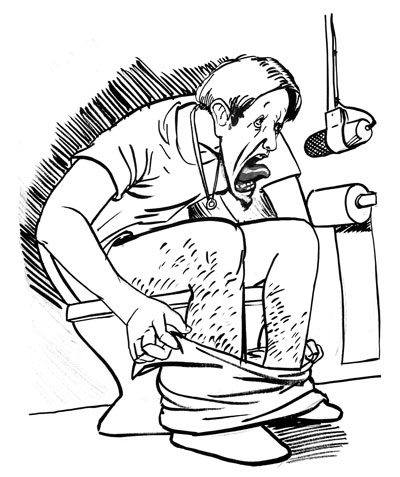Vocal Constipation or Vocal Diarrhea?
Vocal Constipation or Vocal Diarrhea?
Written by Diana Yampolsky
 In
last month's column, entitled 'Vocal Inadequacy - In Need of
Non-Surgical Voice Extension?', I explained how singers can compensate
for short and/or thin vocal cords by strengthening their lower abdominal
and upper diaphragm muscles and working on their facial cavities in
order to make them larger and deeper. This month I would like to talk
about two common "ailments" that have infected quite a few of the
singers that I have come into contact with over the years: "Vocal
Constipation" and "Vocal Diarrhea". In the following paragraphs I will
describe the symptoms (so you can decide if you might be so afflicted?)
and then outline the cures.
In
last month's column, entitled 'Vocal Inadequacy - In Need of
Non-Surgical Voice Extension?', I explained how singers can compensate
for short and/or thin vocal cords by strengthening their lower abdominal
and upper diaphragm muscles and working on their facial cavities in
order to make them larger and deeper. This month I would like to talk
about two common "ailments" that have infected quite a few of the
singers that I have come into contact with over the years: "Vocal
Constipation" and "Vocal Diarrhea". In the following paragraphs I will
describe the symptoms (so you can decide if you might be so afflicted?)
and then outline the cures.
The more common of the two is "Vocal Constipation"; the majority of singers actually suffer from this "nasty disease" to some extreme. The symptoms of this "disease" are clearly visible and easily detected: red stressed neck, bulging veins in the forehead and a very ugly sound coming out of their wrongly positioned body. Doesn't sound very attractive, does it? (You may even have seen these symptoms if you ever had your picture taken during a performance when you were trying to hit a high note; these symptoms are always present when you are trying to "force" out the sound rather than let it come out naturally.) Aesthetics aside, this is actually a very serious issue. While pumping the veins in this manner, the singer is depriving his brain of oxygen and cutting off the circulation, which can actually lead, in extreme cases, to a stroke or heart attack. There are actually known precedents of singers who literally dropped dead on stage!
Regardless of whether this "constipation" is causing discomfort for you or your audience, you can be assured that a cure is available. Firstly, be sure that your body is completely relaxed and at ease, paying special attention to the condition your neck is in. (If you feel that it is very strained, you need to release it from tension as soon as possible.) Secondly, pay close attention to the positioning of your shoulders. (Vocal "Constipators" always have their shoulders in an uplifted position that contributes to attacking the sound from the bottom of their throat, which leads to additional strain on their vocal chords and their vocal box in its entirety.) In my book, Vocal Science - Flight to the Universe, there is a picture of a space shuttle (p.8) which describes the separation of the three components of the space shuttle when it is ready to take off. The lower part is the launching pad, which is equivalent to your physical body from the waist down. You have to stand solid on the ground and be very centered, but not tensed. Then you take a breath, which also involves three components of that wholesome mechanism; the lower abdomen, which is responsible for the support of the height of the sound (make sure you suck your air in, not out, as you will put the "brakes" on your movement), upper diaphragm, which is responsible for the width and body of the sound, and mouth breath, on top of which the sound will be flying on a parallel track in full synchronicity with it. They will allow your voice to work in the fullest capacity possible. This is comparable to the hundred tons of nuclear power, which propels the rocket upwards and gives it a driving force. Please note that the rocket flies above the flame and, hopefully, not with it as it happened in 1986, when the Challenger blew up due to the separation failure upon takeoff. If you follow these principles, your "flight to the universe" will be a safe and pleasant one for you and your audience.
 The
other "disease", "Vocal Diarrhea", is less common, but as its
metaphorical namesake suggests, is quite "messy". Like "Vocal
Constipation" it is also easily detected. Usually, the person with a
weak vocal anatomy and a lack of knowledge of how to properly use their
voice is most likely to be "afflicted". Recently, one of my new clients
came to me with a dance hip-hop track that was pretty well written and
produced. Unfortunately, her vocals were "dripping" all over the music
and did not do justice to the song. (Initially, I did not even realize
how good the song was because the vocals were so weak; sometimes people
forget that the singer makes the song and that the singer is responsible
for properly delivering the main message of the song. In my opinion,
all performers should remember the following equation: good music + good
singing + good production = the total performance. The puzzle will not
be complete if one of these components fails.) I also would like to
mention that this particular vocalist was a slim female of above average
height. Therefore, it was quite natural that her vocal cords were
pretty long but they were thin in diameter. The result of this was that
she possessed a high, light soprano voice that was not really suitable
for the R'N B Hip Hop that she was attempting to sing. As I already
mentioned, I did not have a problem with the length of her vocal cords;
the problem was the width. In last month's column, I explained how you
could work to extend the length of the vocal chords. In this issue, I
will talk about how to widen, not the vocal chords (which is physically
impossible), but the sound they produce. The width of the sound very
much so depends on the upper diaphragm, i.e. your rib cage. It works on a
principle similar to the way in which an accordion works: the air is
pulled in and pushed out as much as the musical phrase is demanding. In
the instance of singing, the upper diaphragm carries the similar
function. The singer has to assess the length-width of the upcoming
musical phrase and open up the upper diaphragm accordingly. The body of
the sound is very much dependent on the flexibility of the upper
diaphragm and, in the majority of cases, its proper use will compensate
for inadequacy of the width of the vocal cords. By the way, the length
of the vocal chords can be "extended" through the proper use of the
lower abdomen; the more you can tuck the tummy in, the better lift the
sound will have off of the vocal chords and the higher the arc will be
and the longer the trajectory of the sound will be. The inertia will
complete the flight.
The
other "disease", "Vocal Diarrhea", is less common, but as its
metaphorical namesake suggests, is quite "messy". Like "Vocal
Constipation" it is also easily detected. Usually, the person with a
weak vocal anatomy and a lack of knowledge of how to properly use their
voice is most likely to be "afflicted". Recently, one of my new clients
came to me with a dance hip-hop track that was pretty well written and
produced. Unfortunately, her vocals were "dripping" all over the music
and did not do justice to the song. (Initially, I did not even realize
how good the song was because the vocals were so weak; sometimes people
forget that the singer makes the song and that the singer is responsible
for properly delivering the main message of the song. In my opinion,
all performers should remember the following equation: good music + good
singing + good production = the total performance. The puzzle will not
be complete if one of these components fails.) I also would like to
mention that this particular vocalist was a slim female of above average
height. Therefore, it was quite natural that her vocal cords were
pretty long but they were thin in diameter. The result of this was that
she possessed a high, light soprano voice that was not really suitable
for the R'N B Hip Hop that she was attempting to sing. As I already
mentioned, I did not have a problem with the length of her vocal cords;
the problem was the width. In last month's column, I explained how you
could work to extend the length of the vocal chords. In this issue, I
will talk about how to widen, not the vocal chords (which is physically
impossible), but the sound they produce. The width of the sound very
much so depends on the upper diaphragm, i.e. your rib cage. It works on a
principle similar to the way in which an accordion works: the air is
pulled in and pushed out as much as the musical phrase is demanding. In
the instance of singing, the upper diaphragm carries the similar
function. The singer has to assess the length-width of the upcoming
musical phrase and open up the upper diaphragm accordingly. The body of
the sound is very much dependent on the flexibility of the upper
diaphragm and, in the majority of cases, its proper use will compensate
for inadequacy of the width of the vocal cords. By the way, the length
of the vocal chords can be "extended" through the proper use of the
lower abdomen; the more you can tuck the tummy in, the better lift the
sound will have off of the vocal chords and the higher the arc will be
and the longer the trajectory of the sound will be. The inertia will
complete the flight.
To conclude, both of these "illnesses" can be cured with the proper "medical assistance" of a good vocal "doctor". Look for more prescribed medicines in the coming months and visit my website at www.vocalscience.com for more vocal prosperity tips.










